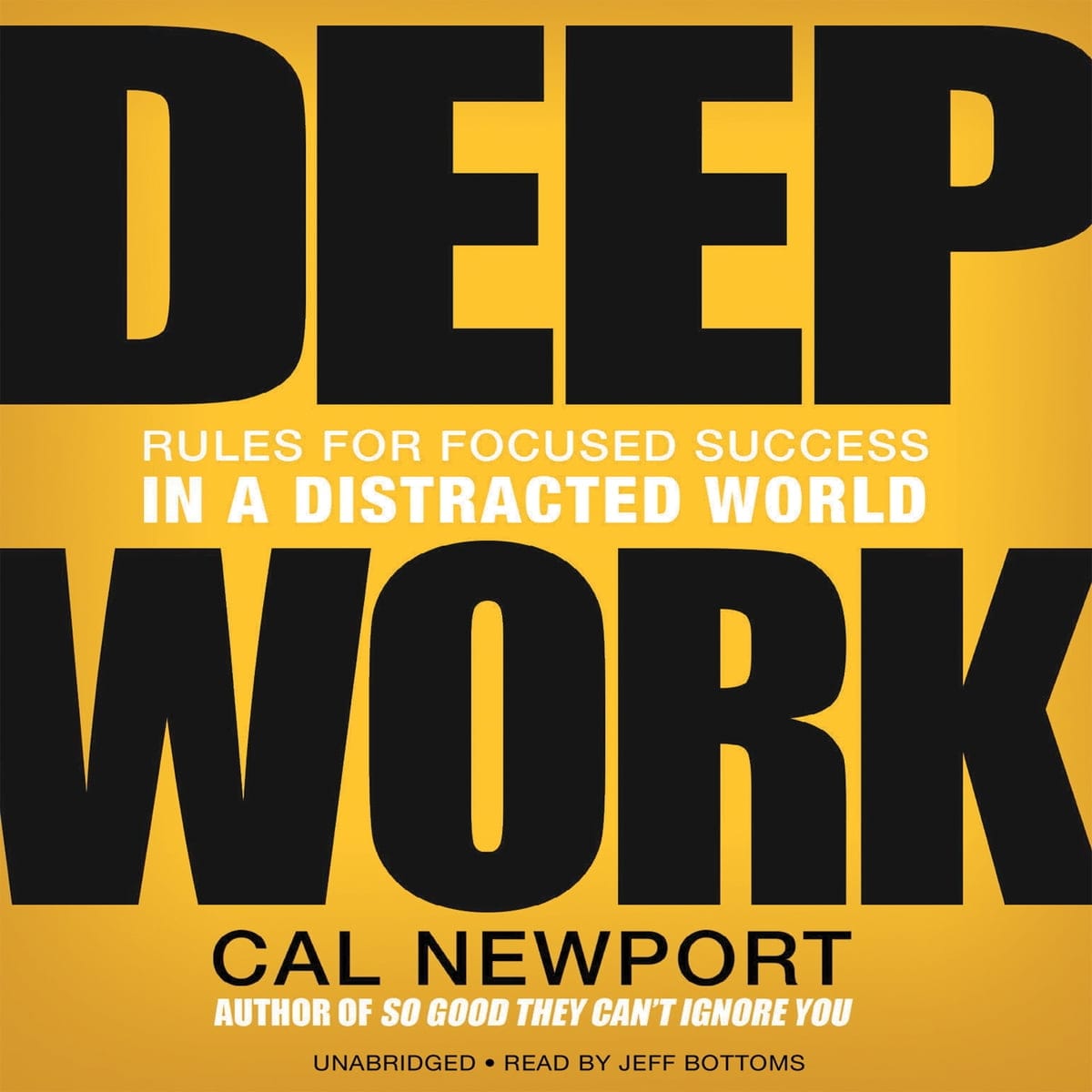Notes and Reflections on “Deep Work” by Cal Newport

Originally written on 2016 January
In “Deep Work”, Cal Newport spends the first third of the book arguing for the importance of “deep work” and the second 2/3s telling you how to achieve it.
Deep Work
Deep work is spending a significant chunk of time in intense focus on a task. It is contrasted with shallow work, which is work that is unimportant or full of distractions. Answering email is shallow work, attending a status meeting is shallow work… A four hour chunk of time with the internet and your phone off, writing a blog post, with no distractions is deep work.
I came in already convinced that deep work is important so I sped through a lot of his arguments for it. Basically, deep work is the fastest and most accurate way to get hard things done. When people say that they do “a weeks worth of work in one day”, they’re usually referring to how they got in five hours of solid, focused work whereas they usually only get one hour of deep work a day.
Elite Work
Deep work refers to time and intense focus. Elite work refers to a tasks’s importance. Elite work is work that leverages your unique skills and talents. If a smart college student could be trained to do the work in under a week, it is not elite work.
Success in this economy comes from being able to do a lot of elite work. If it’s a skill that is hard to acquire and you have it, then your elite work will get you a lot of money, relative to a job where your skills are easily replaceable.
Elite work comes out of deep work because (a) elite work is best done deeply and (b) elite work is the result of spending time learning and learning is best done deeply.
The Death of Deep Work
Newport argues that deep work is dying out relative to the 80′s or the 60′s, because of the rise of open plan offices, notifications on computers, and social media. In general, there is a culture of constant communication which keeps people spending a lot of time emailing, texting, or talking – plausibly important, but fundamentally shallow work.
Achieving Deep Work
So how do you make deep work happen? Newport suggests four key strategies:
- Monasticism - Spend multiple days, if not weeks, solely by yourself with no possible distractions. This is the “cabin in the woods” approach. The goal is to be impossible to find so no one will distract you. This strategy creates the most opportunities for deep work, but it has some psychological drawbacks and it is very hard to actually fit in your life. Reminds me of Chris Bailey’s experiment to be in reclusion for ten days, where he almost went insane.
- Bimodal - Have occasional fits of monasticism, such as a four-day period every week. For your non-monastic days, fit deep work in for a few hours every day. The goal is to be easy to find except during well-defined and well-communicated stretches.
- Rhythmic - The goal is to have a 3-4 hour block every day where you are unreachable and undistracted, but are available otherwise. It is similar to the bimodal approach, though with no fits of monasticism and more emphasis on a larger block of deep work each day.
- Journalistic - The goal is to get deep work in whenever you can, even if it is only in ten minute chunks. This works significantly, significantly worse than the other three approaches, but sometimes it is the best you’ve got and it’s better than nothing. Notably, Newport thinks that three uninterrupted hours is the minimum size an effective deep work block can be, though it varies by task.
Six Disciplines for Deep Work
- Ritualize - Have a dedicated deep work location and ritualize where, when, and for how long you will do deep work. When you start working deeply, ruthlessly eliminate all distractions such as by turning your phone on airplane mode, blocking your email, turning off your internet (if your task allows that). Also ritualize how you’ll energize yourself, such as through healthy food, exercise, and strategic use of caffeine.
- Focus on the wildly important - Have a small number of important ambitions to focus on deep work. Newport picks just two – his job as a professor and his job as a writer. Having more than this could lead to disaster. (I have a problem with this one.)
- Have measures - Newport recommends measuring your productivity with leading measures, which are measures of your inputs that you can change day-to-day and are related to your desired goals (e.g., number of words written, hours spent in deep work) and lagging measures which are more reliable but only visible in the past (e.g., whether or not you get tenure, citation counts, total income).
- Be accountable - Keep score on your measures with other interested people, have a weekly review where you go over your measures and identify good and bad habits, etc.
- Take breaks - Breaks are important and they give you time to recharge. Newport rarely works outside 9-5 and rarely on weekends. Instead he has a shutdown ritual where he makes a plan at the end of the day for the next day and trusts that everything will be taken care of.
- Schedule everything - That which is on your schedule will actually get done.
Training Deep Work
Newport thinks that just as physical endurance requires going to the gym, the mental endurance of deep work requires training and exercise. Newport likes practicing memorizing decks of cards.
Deep Work for Executives
An interesting interlude Newport mentions that I wish was expanded upon is the question of whether executives need deep work, since presumably you can just hire people to do deep work for you. While meetings are the enemy of deep work for the regular worker, meetings can be very effective for managers to accomplish their goals.
I think the need for deep work is still important for managers, but they should feel less guilty about spending time in meetings. They should also focus on providing deep work opportunities for their workers.
How I Achieve Deep Work
Note: as this post is now 5+ years old, this section is incredibly outdated
Schedule
The first step is to designate time for deep work. I’m still new in my deep work habits, but I plan on achieving deep work by creating large blocks of time free of regular meetings or activities:
- 6:30a - noon on Monday
- 6:30a - noon on Tuesday
- 6:30a - 9:30a, 12-4p on Wednesday
- 6:30a - 9:30a, 12:30-4p on Thursday
This would make for 24.5 hours of deep work each week, which is pretty close to what Newport reports he regularly achieves (~20 hours of deep work per week). However, I doubt that I will be able to use every hour each week as some of them will be taken up by non-regular meetings and necessary chores (though I do have chores time in the evenings).
I find it easiest to make my deep work happen in the morning because that’s when I’m at my highest energy and that’s also when I’m the least likely to be interrupted.
Plan
The next step is to plan out what I will do during each deep work block on my calendar, setting aside particular times for particular tasks.
Defend
The last step is to make sure the blocks actually occur as planned and are uninterrupted. This requires identifying a quiet space, making sure other people understand that I’m not to be distrubed, and then making the deep work happen.
This is the hardest part as I work in a high-communication job where things happen fast. I do my best to ensure that if meetings happen, they’re either not in my deep work blocks or are at the beginning or end of my block (maximizing the amount of uninterrupted time).



